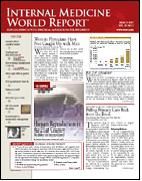Newswatch Triglyceride Levels Inversely Associated with Stroke Severity
Triglyceride Levels Inversely Associated with Stroke Severity
In a recent study, serum triglyceride levels were measured in 863 patients within 36 hours of stroke. Stroke severity on admission was based on the Scandinavian Stroke Scale. Mean serum triglyceride levels were significantly lower in patients with severe stroke (triglycerides, 1.4 mmol/L) than in those with mild/moderate stroke (triglycerides, 1.7 mmol/L). Compared with patients with mild/moderate stroke, those with severe stroke were significantly older and more often had ischemic heart disease or atrial fibrillation (Stroke. 2004;35:e151).
Moderate Obesity Reduces Angioplasty Complications
Patients with moderate-to-severe obesity are at lower risk of complications after percutaneous coronary interventions (PCI) than healthy-weight patients, an analysis of over 95,000 patients enrolled in the New York State Angioplasty Registry showed. Review of body mass index and risk for major adverse coronary events revealed a U-shaped association. Compared with healthy-weight patients, those with class I (moderate) or II (severe) obesity had lower rates of in-hospital mortality and major adverse cardiac events post-PCI, whereas underweight patients and those with class III (very severe) obesity had higher mortality and complication rates. Adjusted risk ratios for in-hospital mortality post-PCI were: 2.69 for underweight, 1.0 for healthy-weight, 0.9 for overweight, and 0.74, 0.67, and 1.63 for moderately obese, severely obese, and very severely obese patients, respectively (Am J Cardiol. 2004;93:1229-1232).
Antipsychotic Use Linked to Sudden Cardiac Death
In a population-based, case-control study, review of medical records from 150 general practitioners enrolled in the Integrated Primary Care Information Project revealed that of 554 cases of sudden cardiac death, 334 were associated with sudden cardiac death. Current use of antipsychotics was associated with a 3-fold increase in the risk of sudden cardiac death. The risk was highest among those using butyrophenone antipsychotics, those with a defined daily dose equivalent of ³0.5, and those using antipsychotics for <90 days. Sudden cardiac death associated with current antipsychotic use was higher for witnessed cases than for unwitnessed cases (Arch Intern Med. 2004;164:1293-1297).
Prickly Pear Extract Helps Alcohol Hangover
An extract from the skin of the prickly pear reduces the symptoms of an alcohol hangover, according to the results of a double-blind, placebo-controlled trial. A group of 55 healthy young adults were randomly assigned to receive the fruit extract or placebo 5 hours before consuming up to 1.75 mg/kg of alcohol. Fruit extract use was associated with significant reductions in nausea, dry mouth, and anorexia the following morning. Overall risk of a severe hangover was reduced by >50% with use of the fruit extract. C-reactive protein levels were strongly associated with hangover severity and were 40% lower in the fruit extract group than in the placebo group (Arch Intern Med. 2004;164:1334-1340).
Daily Multivitamins Use Delays HIV Progression
Multivitamin supplements delay the progression of HIV disease, according to a study conducted in Tanzania. Of 538 pregnant women with HIV infection who were randomized to receive daily multivitamin supplements or placebo and followed for a median of 71 months, 24.7% and 31.1% of the multivitamin and placebo recipients, respectively, had progression to World Health Organization stage IV disease. Women receiving multivitamins had significantly higher CD4 and CD8 cell counts and significantly lower HIV RNA levels compared with the placebo group. Use of vitamin A alone was similar to placebo; adding vitamin A to the multivitamin regimen decreased the benefit for some of the study end points (New Engl J Med. 2004;351:23-32).
